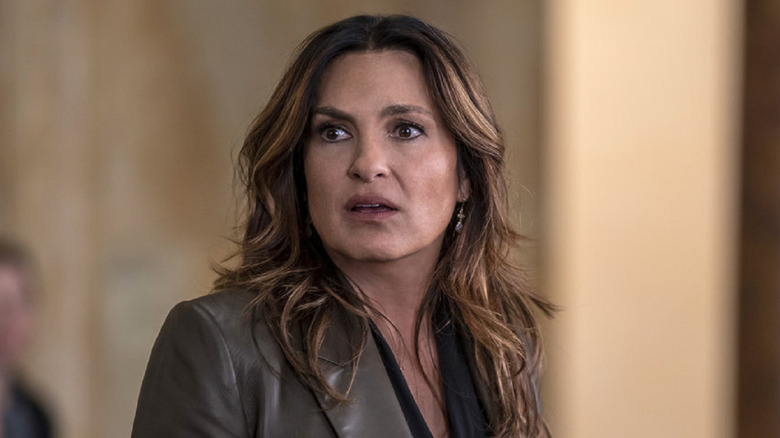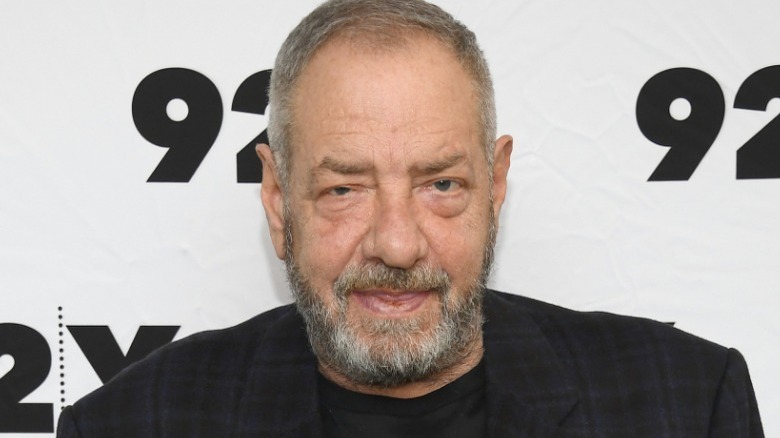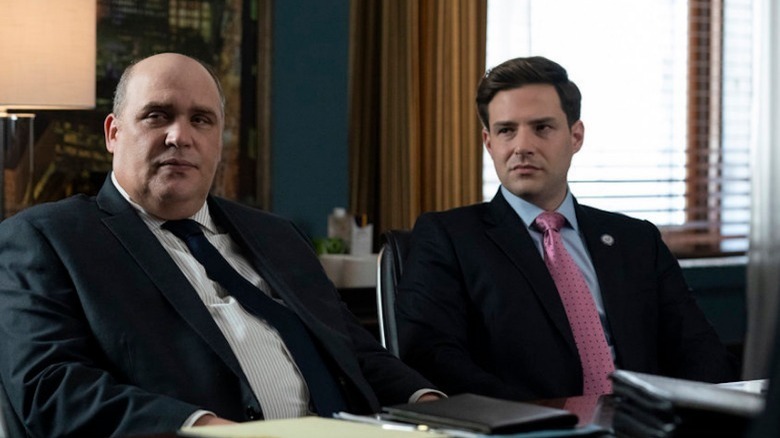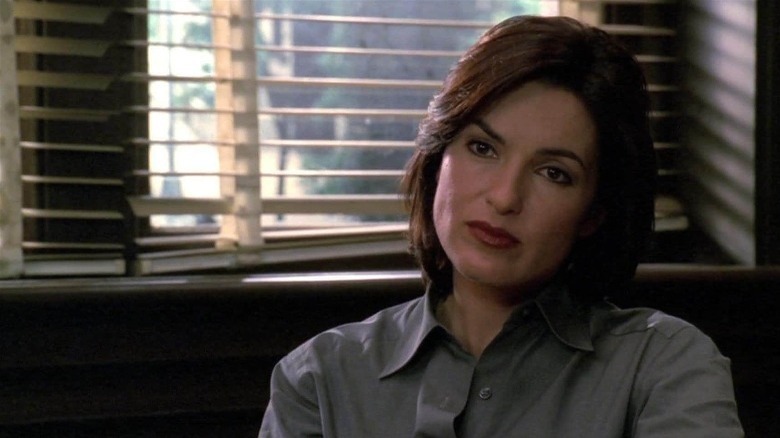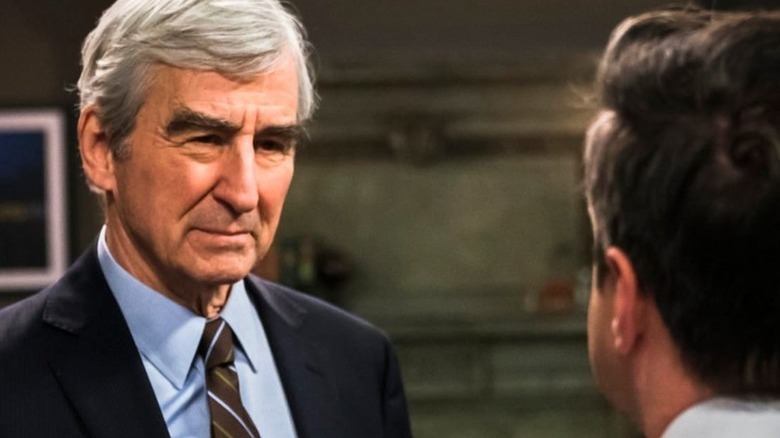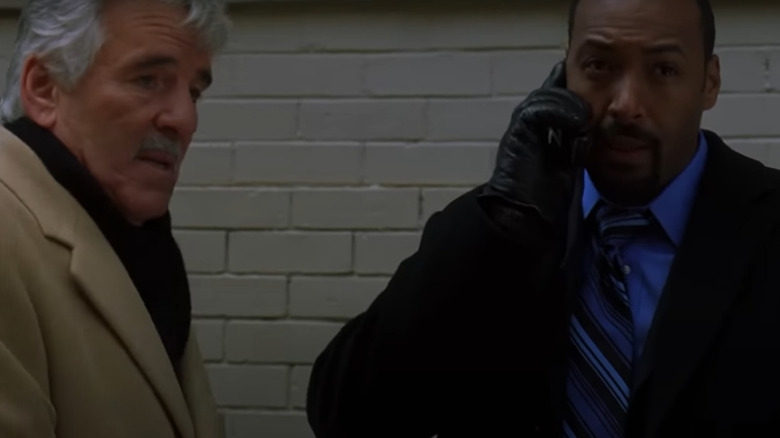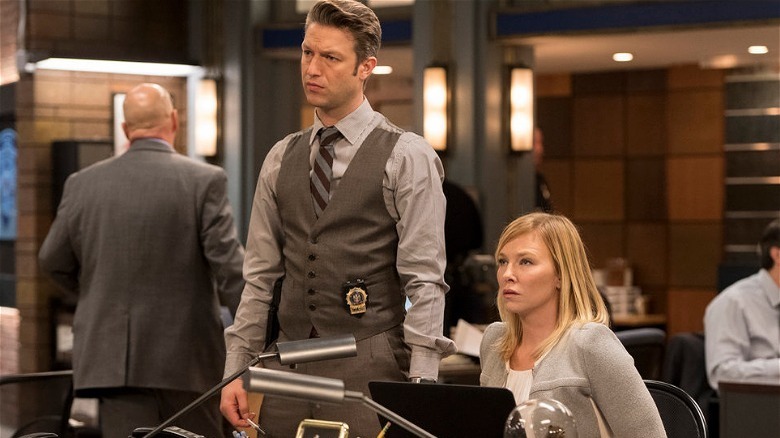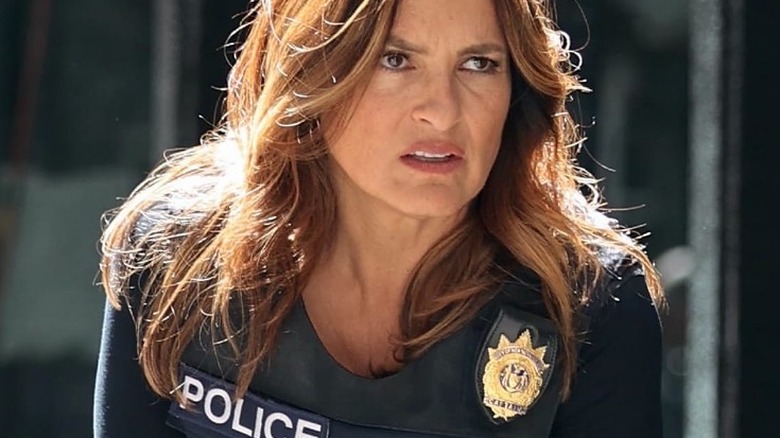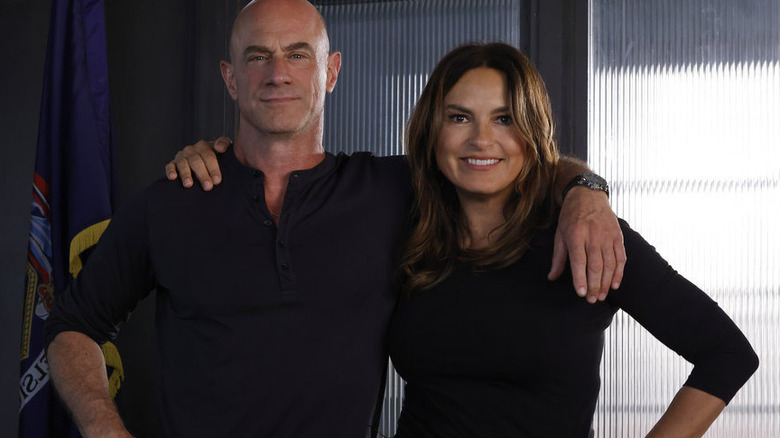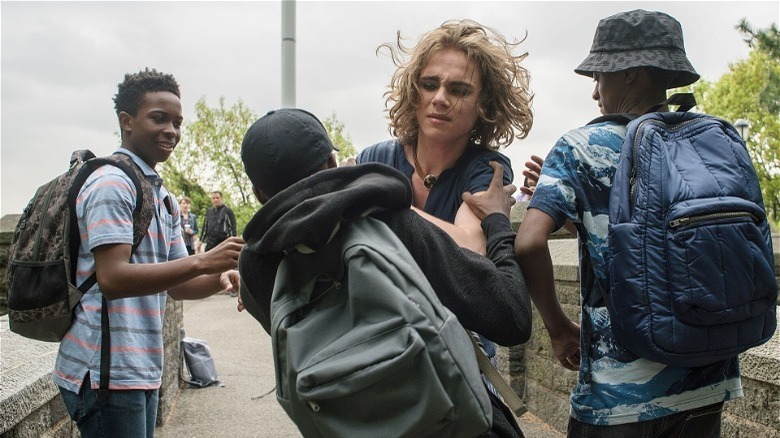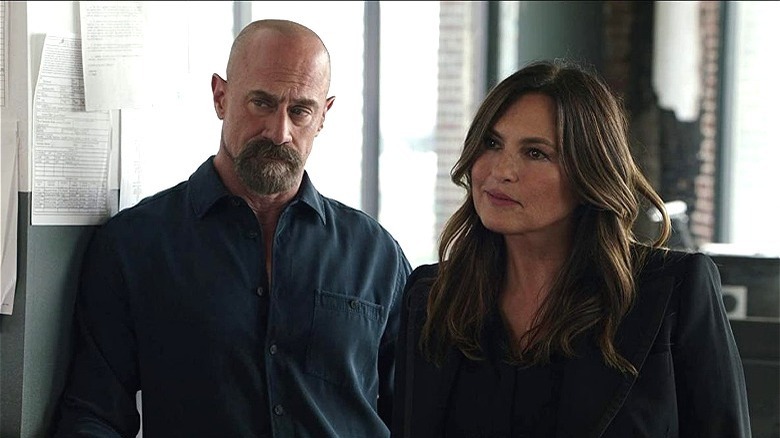Law & Order Storylines That Fans Are Sick And Tired Of
"Law & Order" is one of the longest-running procedural TV shows on the air. It's captured multiple generations of viewers with its winningly straightforward format — 30 minutes of law-following cops working on a case, 30 minutes of order-following prosecutors in court, and a big finish that leaves the audience with a moral dilemma that's a lot more interesting than the nice and neat conclusions other shows have to offer. Since the pilot episode aired in September 1990, "Law & Order" has exploded into a huge franchise with an increasingly diverse fanbase. Between syndication and new content, it's a money-making machine that shows no signs of slowing down. The public simply can't get enough of its heroes, villains, and all who lie in between.
Thirty-three years and seven spin-offs into its tenure, the "Law & Order" franchise has received quite a bit of critical acclaim. The original "Law & Order" series received a plethora of Emmy nominations and wins, as has "Law & Order: Special Victims Unit." Fans of the show, however, can be significantly more critical. Many grew up watching the "Law & Order" franchise evolve over the years, and after more than 1,000 total episodes across dozens of seasons of television, they've become sick and tired of certain storylines. We've condensed fan rants, message boards, and plenty of blogs to answer that question. These are fans' least favorite "Law & Order" storylines.
Too much personal drama
According to the "Encyclopedia of Television Law Shows: Factual and Fictional Series About Judges, Lawyers and the Courtroom, 1948-2008," Dick Wolf initially insisted that "Law & Order" should avoid focusing on their main characters' personal lives. Instead, it would devote itself to its ripped-from-the-headlines plots. Ironically, many modern fans agree with this bygone Wolf opinion: They're sick and tired of storylines that focus on private drama between central characters.
Wolf's original vision for a personality-less procedural was at odds with the TV networks. As he told The Television Academy Foundation in a 2003 interview, Fox originally agreed to pick up the show, then dropped it the next day. CBS ordered a pilot, then passed on "Law & Order" the night before their schedule was announced, stating it lacked major stars. Wolf pitched the show to NBC and landed a one-season deal by winning over executive Brandon Tartikoff. The rest of NBC doubted the show's longevity. Luckily, viewers proved the execs wrong, and after a successful season and the first of many syndication deals, NBC got behind "Law & Order."
In large part, the show succeeded with those early audiences because it stuck to cases and touched on personal storylines only when the characters' private lives impacted them on the job. However, the series changed as time went on, devoting more and more time to characters' private lives. Many fans now complain that recent seasons of the "Law & Order" franchise are entirely too focused on the personalities of its main characters and don't spend nearly enough time in the courtroom. Certain fans on Reddit believe "Law & Order: SVU" is especially guilty of this.
Lives of the rich and famous
The "Law & Order: SVU" subreddit is host to many fan complaints. One of the most major comes from fans who don't enjoy the recent increase in storylines about the wealthy, influential, and elite. It's fine for "Law & Order: Organized Crime" to specifically explore these topics — that's the point of the show. But fans believe that the original show's reboot and other franchise series have become less relatable due to a strict focus on the 1%. Some viewers also find the franchise's explorations into organized crime boring and prefer good old-fashioned disorganized crime stories featuring regular Joe criminals.
Many fans are especially frustrated by Season 21 of "Law & Order." Seven of the season's 10 episodes focus on storylines about the ultra-rich. Famous entertainers, COOs of major tech companies, social media stars, congressional candidates, elite private school-goers, CFOs of Fortune 500 companies, and young Manhattan socialites take up way too much screen time in these viewers' opinion. Similarly, recent seasons of "Law & Order: SVU" focus more on the rich and famous; entertainers, major athletes, and well-connected mobsters are thick on the ground in a large portion of storylines. "It's like more often than not either the victim or perp is famous/well known, an 'influencer,' politically connected, etc." complained Reddit user rachh90. "No one is a regular person anymore."
Victim blaming
Fans love that "Law & Order" handles controversial subjects, but they're sick of one type of storyline: victim blaming. According to Psychology Today, victim blaming is a common reaction to misfortune, violence, and crime. It often looks like accusing survivors of causing their own misfortune. People want a sense of control over the random nature of suffering, so, when misfortune strikes, they wonder what the victim did to deserve it instead of offering empathy and support. This reaction minimizes the impact of crime, marginalizes survivors, and discourages reporting. Most importantly, it diverts attention from the perp.
"Law & Order" is about bringing justice to victims, yet the franchise has blundered into victim blaming territory more than a few times. Some fans even felt compelled to share their least favorite episodes in this regard. "Punk" ("Law & Order" Season 9, Episode 8) disregards prisoners' inability to consent to intimacy with prison guards. "Damaged" (Season 8, Episode 22) marginalizes an underaged and disabled victim because her attackers didn't know she was disabled. "Wanderlust" ("Law & Order: SVU" Season 1, Episode 5) villainizes an underaged girl for being groomed and assaulted by an adult man.
Fans are sick and tired of this sort of storyline. Not only is victim blaming triggering for many viewers who've experienced assault, it's also boring. It is, essentially a cop-out, which sorts characters into tired archetypes fans have seen many times before. Writers could explore more interesting storylines by cutting it out and challenging one of society's ugliest tendencies in the process.
Some antiquated ideas about marijuana
Many fans of "Law & Order" don't enjoy its approach to the legal complexities of cannabis. The series is known for pulling its stories from real-life headlines, which they infuse with enough fiction to keep things interesting and avoid lawsuits. Although decriminalization and legalization of medical and recreational cannabis hit the mainstream when Colorado legalized recreational use in 2012 (via Rolling Stone), "Law & Order" still shies away from storylines about the controversial plant.
Granted, some fans might feel this is a positive. The franchise's attempts to discuss cannabis often come off more like a D.A.R.E. commercial than anything else. The original "Law & Order" relaunch attempts to take on cannabis in Season 22, Episode 11, "Second Chance," but misses the mark by a wide margin. This episode depicts a young, wealthy man getting away with beating someone to death on camera because he was intoxicated on concentrated cannabis when he committed the crime. His "the drugs made me do it" defense is validated by the show, much to the outrage of many fans. "I've been watching all the ["Law & Order" series] for two decades," wrote Reddit user Relevant-Bug-5314 1. "After this cannabis episode I will never watch another episode of this reboot. This episode was infuriating."
Predictable stories
Staying fresh is, of course, a challenge for a decades-spanning franchise that bases itself on current headlines and the fluctuations of the justice system. But many believe things could be a whole lot less stale with a little more effort. "I fell in love with the show in the early seasons because of the mystery, the twists, the stories and the cast," wrote Reddit member Britty_kitty4. "Remember when the episodes would start with something but then end up being about something totally different or when you didn't know who the bad guy was in the first 5 minutes[?]"
Earlier seasons are lauded by fans for having more twists, overlapping plotlines, and nuanced commentary. Much like James Bond movies, the brilliance of "Law & Order" is in its convoluted, action-packed storylines that keep viewers engaged minute to minute without a clear, comprehensible plot. Fans love watching reruns of earlier seasons of the show because they can catch new details each time.
However, fans complain that later season storylines are too straightforward and lack the re-watch quality they know and love. Many claim to figure out the perp's identity right away and spend the rest of the episode in impatient agony, tortured by the show's current "all talk and no action" approach.
Are the storylines too simple? Are fan appetites for complexity growing? Perhaps pattern recognition is to blame; after enough episodes, trends become clear to fans and twists become more challenging to pull off.
"The lack of acquittals/plea bargains is annoying," wrote Reddit user spoilerdudegetrekt. "Having ~20% of the episodes end with the criminal getting away made the show actually have suspense."
Unresolved endings
Many episodes of "Law & Order" end with moral dilemmas that leave viewers to make their own conclusions. Unlike most television series, the next episode picks up on an entirely new story and leaves the dilemmas unresolved most of the time. Although fans appreciate moral ambiguity, they don't appreciate unresolved plotlines.
"It's an irritating, recurring thing the writers still do," wrote Reddit member Foreign_Quality_9623. "Now that 'sister channels' are rerunning marathons and all day 'binges' of episodes sequentially, the disconnect between episodes reveal the original Wolf formula of 7-day separation between episodes. An episode's ending more often than not doesn't segway into the next episode, ie, it just gets dropped."
Back in the network television era, the show succeeded because viewers had an entire week to discuss their reactions to the most recent episode with friends and co-workers, then forget the details of the prior episode by the time the next episode aired. The show relied heavily on plotlines that remained episodic and case-focused, so "Law & Order" was an easy show to jump into at any point without too much contextual knowledge.
However, the modern binge-watcher doesn't take kindly to decades of unresolved plotlines. Streaming multiple episodes of "Law & Order" in quick succession can feel disjointed, leaving plenty of loose ends to keep fans up at night.
Loose-cannon cops
When "Law & Order" first aired in 1990, renegade cops who broke the rules for the right reasons were all the rage. Those same loose-cannon cop storylines have not aged well today. Many fans cite discomfort watching episodes of the show when protagonists behave violently or bend the law for personal reasons. Fan message boards are filled with threads unpacking the content of the franchise through a modern lens.
"My unpopular opinion: Stabler is a terrible cop and I hate his character because of his violent tendencies," wrote Reddit user monotint.
"I'm with you on Stabler," agreed fellow fan and Reddit member Exotic-Huckleberry. "At 14, watching him crack some pedophile skulls was awesome, but 20 years later, we're in a very different climate. Knowledge of police brutality is mainstream, and the way it often disproportionately impacts POC is too much common knowledge to just ignore."
Although the show excused erratic, violent behavior from its main characters, the "Law & Order" franchise has many storylines in which the perp ended up being a cop. For example, "Hysteria" ("SVU" Season 1, Episode 4) explores the complexities of investigating a fellow cop for heinous crimes.
The show strikes a tenuous balance of addressing police corruption while creating compelling police leads, but it's too little too late. When "Law & Order" criticizes police corruption while selling erratic, violent police as the solution, it just doesn't hit fans like it used to.
Bad romance
One of the few things fans of the various "Law & Order" franchises can agree on is their distaste for forced romance. Fans are especially sick and tired of the romantic overtones in "Law & Order: SVU" between Benson and Stabler after years of zero chemistry and a fruitful working relationship.
"They've FORCED this narrative of a romantic relationship with Stabler and Olivia that was NEVER there before," wrote Reddit user britbesos. "They've always been friends and Olivia has always respected his wife and marriage. And Stabler has always been faithful to his wife. So to make it seem like there was this undenying [sic] romance all along just ruins her character and his for me."
Some fans attribute the shift toward romantic 'will-they-won't-they' tension to changes in the show's ensemble format. Early seasons of "Law & Order" featured a larger ensemble cast that kept things fresh and interesting, but later seasons focus on a dwindling number of prominent characters and fewer options for interesting arcs between them.
Forced romantic entanglements amongst main characters continues to be a prominent fan complaint. "Law & Order" fans are loud and clear: They want storylines to focus on the case at hand, not personal drama.
Stereotypes of marginalized communities
"Law & Order" writers do their best to tackle complex topics such as racism, homophobia, transphobia, and sexism. However, some members of marginalized communities are sick and tired of seeing storylines that perpetuate harmful stereotypes on the show.
Reddit member monotint shared, "Why is it the majority of the time, when the victim is East Asian that a human trafficking ring is somehow involved? If that's not perpetuating a racist trope, I don't know what is."
Members of the trans community have complaints about harmful representation, too. They're sick and tired of storylines about trans sex workers, victims, and villains. Fans cite "Transgender Bridge" ("Law & Order: SVU" Season 17, Episode 3) most often when discussing episodes that are hardest to watch. A Reddit user specified which parts of "Transgender Bridge" didn't sit well with them, listing "the transphobic content, the apology artwork, the forgiveness of the parents towards the boy [who killed their teenage trans daughter], the judge's ruling, the boy's mom" as main offenders, adding, "god the whole episode is so so painful to watch."
The disconnect with marginalized communities correlates to a lack of diversity in "Law & Order" writers. According to a study by the Color of Change, crime TV shows distort understanding of race and the criminal justice system. "Law & Order: SVU" ranked as one of the top five problematic crime dramas in the 2018-19 season; the show employed 93-100% white writers, and 57% of those writers were male. For a show specifically about issues faced by marginalized communities in a system heavily biased against them, it's troubling to see those who are the least affected by those issues are in the majority of people who write about and profit off it.
Fans of "Law & Order" find attempts to depict minorities without lived experience severely cringey and would prefer diverse writers and plotlines moving forward.
Heavy-handed politics
Over the three plus decades "Law & Order" and its spinoffs have been on the air, the franchise has grown steadily by retaining old fans and consistently attracting new audiences through current events and political commentary. Its robust fanbase ranges from elderly folk to Gen-Z kids watching out of guilty pleasure. As such, fans disagree on how "woke" the show is, and whether that's a good thing.
Older fans state early seasons of the show addressed current topics with more deftness and allowed main characters to have differing opinions. They dislike newer seasons for being "too PC" and heavy-handed with political statements.
"I'm a LaO fan since the first season," wrote Reddit user XxElectricgypsyxX. "I've watched virtually every episode love or hate. Honestly, the 'wokeness' is pretty annoying now."
Younger fans disagree that the show is any more PC or heavy-handed now than it was in earlier years.
"L&O always covered social issues and racial injustice," wrote Reddit member NotaNoonoob. "If you live long enough, your comfort zone is usually somewhere in the past and new generation ideas seem crazy or over-the-top."
"Nothing seems over the top to me," replied Reddit user XxElectricgypsyxX. "The writers' earlier seasons were better at blending the stories so that they were there and part of it all more seamlessly. Now it seems more like lectures. I think the writers did a better job back then."
Fans agree that while they appreciate the show's commitment to current affairs, they don't enjoy storylines that feel "preachy" or predictable. Meeting fans' high and sometimes paradoxical standards for storylines is always a challenge for the "Law & Order" franchise, but it will never run out of new current events and opportunities to give the people what they want — a semblance of law and order.
